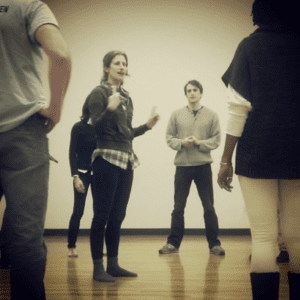Letters from the Rehearsal Room Part Two

Actor Sarah Sanford (Olga) leads a group warm-up with the cast of Three Sisters. Photo courtesy of guest Instagrammer Sam Tower.
Dear Audience –
Welcome to week four of Three Sisters rehearsal. In a typical Arden rehearsal process, we would be nearing the end of our time in the rehearsal room and preparing to move to the stage. But this isn’t a typical process. Thanks to support from the Pew Center for Arts and Heritage, Three Sisters has an extended rehearsal period—a luxurious 6 weeks instead of 4. It seems like a small change, >see but has allowed us time for avenues of exploration that we ordinarily wouldn’t have time to try. One of the most exciting has been the experiments we’ve been attempting with actor, teacher, and director Emmanuelle Delpech on clowning.
The word clowning often conjures images of large shoes, giant pants, and red noses. Carnivals and birthday parties. But that’s only one version of clowning. Thanks in part to long traditions in Italy, France, and Russia, clowning has become a respected form of theatre grounded in improvisation and rigorous movement technique. The emphasis is on the physical and spontaneous playing of the actor, an “outside-in” technique in which physicality leads you to character rather than the other way around.
We think of clowns as funny. And often they are. But sometimes it will break your heart. Really great clowning relies on the tension between the comedic and the heartbreaking, and that’s also true of really great Chekhov. So as we were diving into textual analysis, we were also excited to attack the characters from the opposite angle.
Emmanuelle has been visiting rehearsal for the last two weeks to explore. It’s rigorous work. Everyone sweats. At first we worked outside the play, accessing silly and primal states through a series of exercises led by Emmanuelle. But in her last visit we began using these exercises to explore character. We started with an exercise called “I have a little secret” in which the cast broke into small groups and developed short performance pieces. As their characters, they had to decide on a secret, and then had to share it with us through song. They had a little time to prepare, but most of the performance of the song was improvised. The secrets ranged from those based on literal lines from the text (one character told us he was drunk, believing no one could tell) to the subtextual (one character told us he really hated his wife) to the extra-textual (one character told us she spoke to the ghosts of her ancestors), but all were deeply personal and often as surprising to the actor saying them as to us.
One of the most moving exercises revolved around the concept of pushing and pulling. Emmanuelle focused on Vershinin, the character played by Ian Merrill Peakes, whose secret was that he loved his daughters. She asked him to imagine his daughters standing on one side, and the woman he loves on the other: “imagine what is tearing you apart, what is breaking you apart,” she commanded. “You are in the middle. Now physicalize.” Ian reached as far as he could in one direction without moving his feet, then the other. As he stretched himself desperately one way and then the other, she encouraged him to make the gesture smaller and smaller, until it stopped resembling the large movements of a dancer and started looking more like a real person—the breaking apart manifesting in the tension in his shoulders, the wideness of his stance, and, most movingly, in the despair in his eyes. Emmanuelle ended the exercise by asking him to choose one over the other, and he did. I won’t tell you which, except to say that in the two minute exercise he lived the arc Vershinin takes over three acts. Following another exercise, Emmanuelle asked what it was like to be up there as the character to which Becky Gibel (Natasha) replied: “Sometimes I forget, and then I remember.” It’s easy to forget as the audience too.
As director Terry Nolen says: “once it’s in the room, it’s in the room.” You won’t see Ian stretch his arms so far apart you worry for his back. But you might see a tension in his shoulders, a step in one direction, then the other. And you’ll feel that he’s tearing himself apart. You’ll feel what Emmanuelle calls “the tragic dimension” in the performances. You’ll experience “the activity of believing not with your brain, but with your breath.”
Sincerely,
Sally Ollove
Dramaturg, Three Sisters
PS: Then there was the exercise in which Scott Greer narrated the story of Swan Lake while dancing it, but you’ll just have to imagine that for yourselves.
READ the first post in our Letters from the Rehearsal Room series
